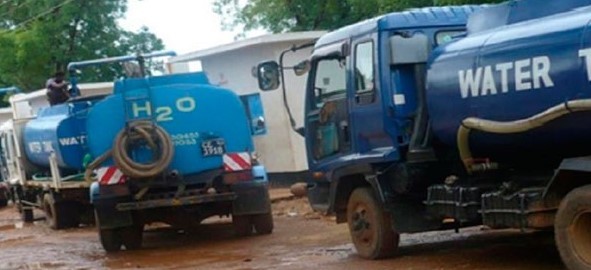Residential areas in the South Sudanese capital, Juba, are witnessing a scarcity of water due to unfavourable price of the US dollar against the nation’s currency in the market.
The majority of Juba residents depends on water supply from the River Nile. The city depends on water supply from mostly privately owned water tankers.
Many families, especially civil servants, haven’t received their salaries for several months as the country battles weak oil prices. The South Sudanese Pound is depreciating rapidly, amid soaring prices of commodities in the market.
As of Thursday, the local currency plunged to 500 Pounds to the US dollar on the parallel market.
Speaking to Radio Tamazuj on Saturday, several residents said they were facing difficulties in getting water for several days, pointing out that water tanker owners have hiked the price of water.
Ayaa Wani, a resident of Juba, said she can no longer afford to buy water.
“When you get water, water tanker owners would tell that the price of a drum of water has increased to 500 SSP. But if I cannot pay 500 SSP, where can I get water?” She asked.
Wani appealed to the government to find a solution to their problem and support water distributors who are complaining about a scarcity of hard currency to run their business.
Ayaa’s family is not the only one complaining since water prices began to rise in Juba recently.
Josephine, a resident of Atlabara neighbourhood, said: “I am coming from a poor family, so I cannot afford to have a drum of water which costs 600 SSP. previously, we used to buy at 250 SSP, but when you ask why they have increased the price, they say the dollar rate is high.”
“I often walk for two hours to fetch water from a borehole. So, I urge the government to moderate the rate of the US dollar because not all the families have access to the US dollar,” she appealed.
Mary Keji, another resident, said: “I was attending a workshop on Friday, but when I returned home, I found no water because everything increased.”
“According to what I heard, water distributors are complaining that the traffic police on the way charge them a lot of money, that’s why they are also charging the civilians,” she further said.
Evans Baguma, a water tanker owner in Juba, attributed the problem to unfavourable prices of foreign currencies against the South Sudanese Pound in the market.
“We are incurring losses because everything has increased. Previously, I used to sell a 50 litres drum at 250 SSP, but now it is 350 SSP. We used to pay the Juba City Council 50 SSP, but now we pay them 250 SSP every day,” he said.
“Also, getting water from the company is very expensive, and they have increased everything. I urge the government to reduce the prices. Now, we buy one litre of fuel at 280 SSP,” he added.
Government officials in Juba could not immediately be reached for comment.
A South Sudanese economic analyst last week suggested to the government to call people with proven expertise and capabilities in economics to help save the country’s economy from collapsing.
"The solution for the current economic crisis is to engage economists and public administrators to come up with good policies on how the economic crisis can be addressed," Professor Akim Ajieth told Radio Tamazuj.
Juba, home to the Nile, is not considered to be a water-scarce city. But hyperinflation has caused a water crisis.
Access to water and sanitation is recognized by the United Nations as human rights, reflecting the fundamental nature of these basics in every person’s life.
Citizens are rights-holders and governments are duty-bearers of providing water services. Rights-holders can claim their rights and duty-bearers must guarantee the rights to water equally.




